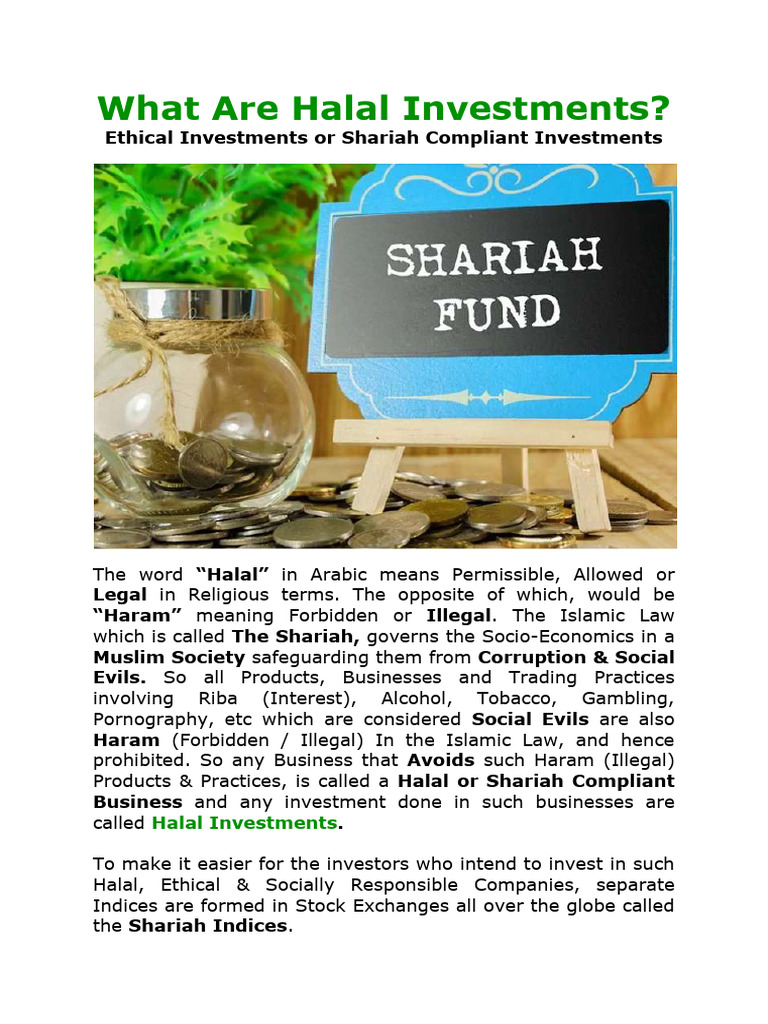In today’s financial landscape, the importance of investing in accordance with ethical beliefs has become more prominent. Ensuring that investments align with Islamic principles propels many towards understanding halal investment options. Halal investments are essential for Muslims desiring to grow their wealth without transgressing their faith. This article delves into the realm of halal investments, specifically shedding light on halal gold investment, which serves as a refuge for many investors seeking compliance with Sharia law while maintaining financial growth.
Understanding Halal Investments: An Overview
Halal investments are those that adhere to Islamic law (Sharia). This means that any investment made should not only be devoid of interests (Riba) but also free from any form of gambling (Maisir) and risk of uncertainty (Gharar). In the complex world of finance, it often becomes challenging to decipher which investment avenues qualify under these guidelines. However, as more Islamic financial products surface, navigating this landscape is becoming increasingly easier.
Why Consider Halal Gold Investment?
Gold, often referred to as a “safe haven,” presents captivating opportunities for investors. Halal gold investment allows Muslims to engage in a globally recognized and time-tested asset without breaching Sharia laws. When investing in gold, whether through direct purchase or investment funds, the crux lies in ensuring compliance with Islamic tenets.
Exploring Halal Gold Investment
This image encapsulates key information regarding the processes and benefits surrounding halal gold investment. This infographic simplifies representing how gold can work within an Islamic framework to deliver ethical returns.
Mechanics of Halal Gold Investment
The mechanics of halal gold investment include several methods, each ensuring compliance with Sharia law. Below are some popular methods that investors can consider:
- Direct Purchase: This method involves purchasing physical gold, such as coins or bars. Ensure that transactions do not involve any interest fees and that they are settled immediately.
- Gold Exchange-Traded Funds (ETFs): Investing in Sharia-compliant ETFs allows investors to benefit from gold price movements without holding the physical asset. Ensure these funds do not involve interest-based strategies.
- Gold Mutual Funds: Similar to ETFs, these invest in gold mining companies and related industries but require careful scrutiny to ensure adherence to Sharia principles.
Diverse Options Within Halal Investments
While halal gold investment remains a crucial pillar for many Muslim investors, it is essential to recognize the broader spectrum of halal investment opportunities available, including:
- Halal Stocks: Investing in stocks of companies that operate within the framework of Islamic law, avoiding those with vested interests in prohibited industries such as alcohol, gambling, or pork products.
- Islamic Mutual Funds: These offer a diversified investing approach while ensuring that all investments comply with Sharia. They pool investors’ money to invest in halal equities and sukuk (Islamic bonds).
- Sukuk (Islamic Bonds): As an alternative to traditional bonds, sukuk generates returns without breaching Islamic law. They derive profits from tangible assets, services, or projects rather than interest.
Investment Principles to Remember
When navigating the world of halal investments, certain principles must always be considered, particularly with halal gold investment:
- Transparency: Be clear on all contracts and investment agreements. Understand what your money is being invested in and the expected returns.
- Risk Management: Diversifying your investment portfolio is crucial. Regardless of the halal options you choose, spreading investments can mitigate risks associated with market volatility.
- Continuous Learning: Always stay informed about changes in Islamic laws pertaining to investments and market trends that could affect your halal gold investment strategies.
Cultivating a Sustainable Investing Mindset
The rise of halal investments reflects a growing desire to invest ethically while ensuring financial growth. Embracing halal gold investment not only satisfies an investor’s religious obligations but can also create a solid foundation for future savings and generational wealth. Islamic finance encourages Muslims to engage with the economy responsibly, making educated investment choices that positively influence society.
Conclusion: Steps Toward Successful Halal Investment
In summary, halal investments present a compelling opportunity for Muslims to responsibly manage their finances. Investing in halal gold is one of many profitable pathways. However, it is essential to remain committed to continuous learning and monitoring investments to ensure they align with Islamic principles. Several resources are available for those new to this financial journey, including workshops, online courses, and financial advisors specializing in Islamic finance.
By laying a solid foundation in halal investments, particularly with a focus on halal gold investment, you’re not only securing your financial future but also adhering to your values and beliefs. Start familiarizing yourself with the various options available, determine a plan, and confidently engage in halal investing.
Always conduct extensive research before making any investment to ensure you’re adequately equipped to thrive within the halal investment sphere. Compiling knowledge and taking steps toward responsible investing will ensure that your portfolio reflects both your financial goals and your ethical standards.
Invest wisely, responsibly, and within the parameters set forth by your beliefs, and you’ll pave the way toward a prosperous financial tomorrow.



